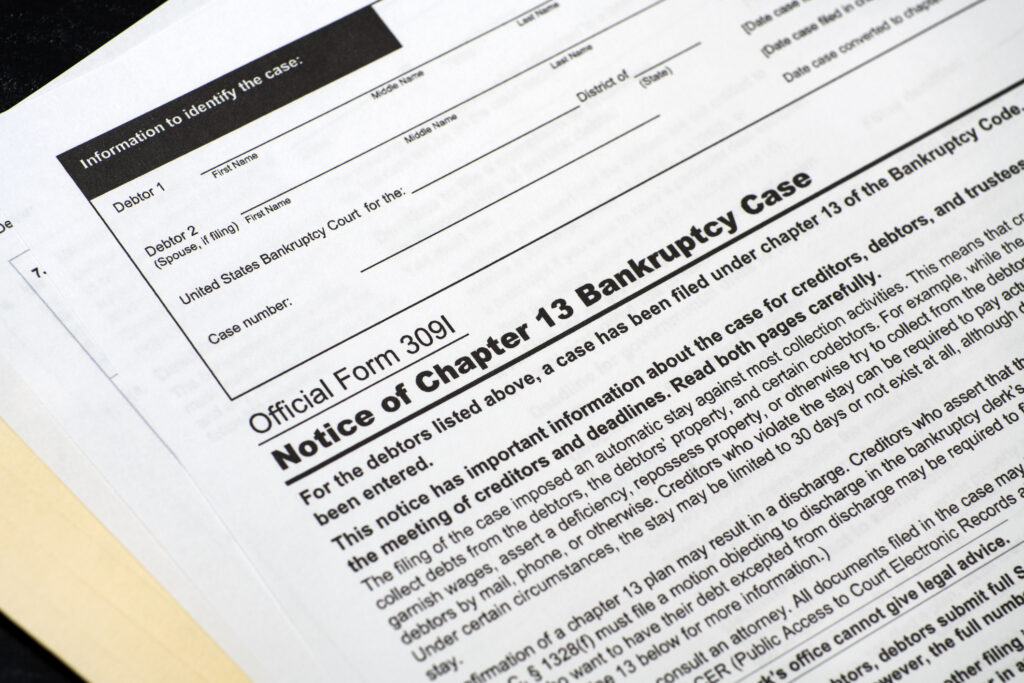
How to Know if Chapter 13 Bankruptcy is Right for You
Dealing with financial difficulties can be stressful, and deciding how to handle overwhelming debt isn’t easy. If you’ve been researching options, you might have come across Chapter 13 bankruptcy. But how do you know if it’s the right choice for you? In this guide, we’ll explore the signs that Chapter 13 bankruptcy could be a good fit, how it compares to other options, and what factors you should consider before making a decision.
By the end of this article, you’ll have a clearer understanding of whether Chapter 13 bankruptcy aligns with your financial goals and situation.
What Is Chapter 13 Bankruptcy?
Before diving into the signs that Chapter 13 might be right for you, let’s quickly review what it is. Chapter 13 bankruptcy, also called “reorganization bankruptcy,” allows individuals to restructure their debts into a manageable repayment plan. Over three to five years, you’ll make regular payments to a bankruptcy trustee, who distributes the funds to your creditors. Once the repayment plan is complete, any remaining eligible debts are discharged.
Unlike Chapter 7 bankruptcy, which involves liquidating assets to pay off debts, Chapter 13 lets you keep your property as long as you follow the repayment plan. It’s especially useful for people with a steady income who want to catch up on overdue payments or protect assets like their home or car.
Signs That Chapter 13 Bankruptcy Might Be Right for You
Here are some signs that Chapter 13 bankruptcy could be the best choice for your situation:
- You Have a Steady Income but Struggle to Manage Debt
Chapter 13 bankruptcy is ideal for individuals who have a reliable source of income but are overwhelmed by their financial obligations. If you’re earning enough to cover basic living expenses but can’t keep up with debt payments, Chapter 13 can help you create a repayment plan based on what you can afford.
For example, if you’ve fallen behind on mortgage payments or car loans but have the means to catch up over time, Chapter 13 might allow you to avoid foreclosure or repossession.
- You’re Facing Foreclosure or Repossession
One of the biggest advantages of Chapter 13 bankruptcy is its ability to stop foreclosure or repossession. When you file, an automatic stay goes into effect, halting all collection efforts by creditors. This includes stopping foreclosure proceedings on your home or repossession of your car.
Through Chapter 13, you can include overdue payments in your repayment plan and gradually catch up. This gives you a chance to keep your property while regaining control of your finances.
- You Have Significant Secured Debts
Secured debts, such as a mortgage or car loan, are backed by collateral. Chapter 13 bankruptcy can help you manage these types of debts. Unlike Chapter 7, where you might lose the collateral if you can’t pay, Chapter 13 lets you include missed payments in your repayment plan. This allows you to keep essential assets while making progress on what you owe.
- You’re Unable to Qualify for Chapter 7 Bankruptcy
Not everyone qualifies for Chapter 7 bankruptcy, which has strict income requirements. If your income is too high to pass the means test for Chapter 7, Chapter 13 is an alternative that can still provide relief. While Chapter 13 requires a longer commitment to a repayment plan, it’s a way to address your debts without liquidating your assets.
- You Want to Protect Cosigners
If someone has cosigned a loan for you, Chapter 13 can provide an extra layer of protection for them. The automatic stay that comes with filing also extends to cosigners in some cases. This means creditors can’t go after your cosigner for repayment while you’re in the bankruptcy process.
- You Have Debts That Can’t Be Discharged in Chapter 7
Certain debts, like tax obligations, child support, and alimony, typically can’t be discharged in Chapter 7 bankruptcy. Chapter 13 allows you to include these priority debts in your repayment plan and pay them off over time. This makes it a better option if you have significant non-dischargeable debts.
- You’re Committed to Repaying Your Debts
Chapter 13 is a good fit for people who genuinely want to repay their debts but need more time and structure to do so. If you’re willing to stick to a repayment plan and make consistent payments, Chapter 13 can provide a pathway to financial recovery while preserving your assets.
Comparing Chapter 13 to Other Debt Relief Options
Deciding whether Chapter 13 bankruptcy is right for you means comparing it to other options. Here’s how it stacks up against alternatives:
- Debt Consolidation
Debt consolidation involves combining multiple debts into a single loan with a lower interest rate. While it can simplify payments, it doesn’t reduce the total amount you owe.
Chapter 13, on the other hand, may reduce the amount you have to repay on unsecured debts and provides the protection of an automatic stay.
Debt consolidation also requires good credit to qualify for favorable terms. If your credit score has already taken a hit, Chapter 13 might be a more realistic option.
- Credit Counseling and Debt Management Plans
Credit counseling agencies can help you create a debt management plan (DMP) to pay off your debts over time. These plans often involve negotiating lower interest rates with creditors. However, they don’t offer the same legal protections as bankruptcy.
If your debt is too high to manage through a DMP or creditors aren’t willing to cooperate, Chapter 13 provides a court-supervised plan that ensures compliance from all parties.
- Chapter 7 Bankruptcy
Chapter 7 is often faster and allows you to discharge unsecured debts without repayment. However, it’s not an option for everyone. If you don’t qualify due to income restrictions or have significant assets you want to protect, Chapter 13 may be the better choice.
Factors to Consider Before Filing for Chapter 13 Bankruptcy
While Chapter 13 bankruptcy offers many benefits, it’s not without its drawbacks. Here are some factors to weigh before deciding:
- Commitment to a Long-Term Plan
Chapter 13 requires a three- to five-year commitment to a repayment plan. During this time, you’ll need to stick to a strict budget and make regular payments. If you’re not prepared for this level of discipline, it might not be the best fit.
- Impact on Credit
Like any form of bankruptcy, Chapter 13 will negatively affect your credit score. It will remain on your credit report for up to seven years, which can make it harder to secure loans or credit in the future. However, some people find that their credit begins to improve once they start making consistent payments.
- Cost of Filing
Filing for Chapter 13 involves court fees and attorney fees, which can add up. While these costs are often rolled into your repayment plan, they’re still an expense to consider.
- Eligibility Requirements
To qualify for Chapter 13, you must have a steady income and debts within the allowable limits. If you don’t meet these requirements, you’ll need to explore other options.
- No Immediate Debt Relief
Unlike Chapter 7, which discharges eligible debts quickly, Chapter 13 requires you to repay a portion of your debts before receiving a discharge. If you’re looking for immediate relief, it may not be the best option.
How to Decide if Chapter 13 Is Right for You
If you’re still unsure whether Chapter 13 bankruptcy is the right choice, here are some steps to help you decide:
- Assess Your Financial Situation
Start by taking a close look at your income, expenses, and debts. Can you realistically make monthly payments under a repayment plan? Are there assets you want to protect? Understanding your financial picture is key to making an informed decision.
- Consult a Bankruptcy Attorney
An experienced Colorado bankruptcy attorney can evaluate your situation and help you determine whether Chapter 13 is a good fit. They can also explain the process, costs, and potential outcomes.
- Consider Your Long-Term Goals
Think about what you want to achieve financially. Are you focused on keeping your home or car? Do you want to repay your debts over time? Chapter 13 is a long-term commitment, so it’s important to align it with your goals.
- Explore Alternatives
Before filing, explore other debt relief options to see if they might better suit your needs. Sometimes, a debt management plan or even negotiating directly with creditors can provide relief without the need for bankruptcy.
Final Thoughts
Chapter 13 bankruptcy isn’t the right solution for everyone, but it can be a powerful tool for those who qualify. If you have a steady income, need to protect your assets, and are willing to commit to a repayment plan, Chapter 13 might provide the fresh start you need. By understanding the signs that it’s the right choice and carefully weighing your options, you can make a decision that sets you on the path to financial recovery.
Remember, you don’t have to navigate this process alone. Consulting with a qualified bankruptcy attorney can provide clarity and help you take the next steps with confidence. Bankruptcy isn’t a failure—it’s a chance to rebuild and move forward.
Read more articles here:
What Are My Options if I Can’t Complete My Chapter 13 Bankruptcy Plan?



